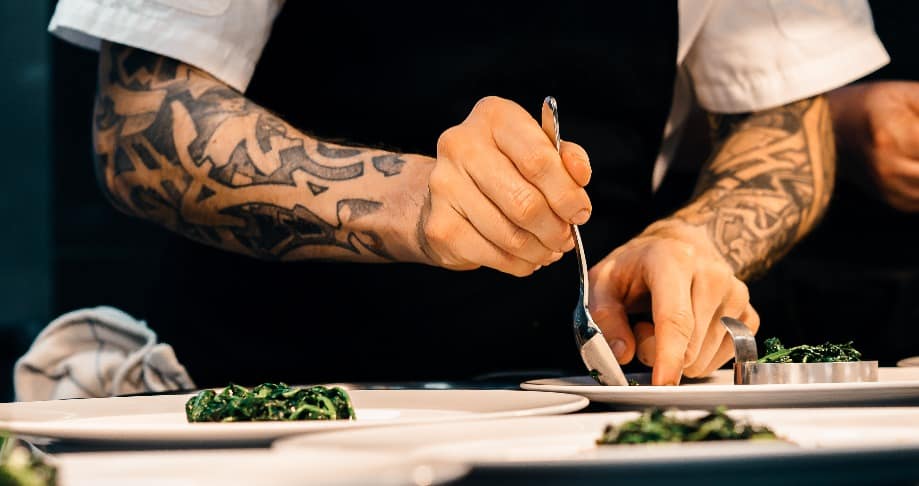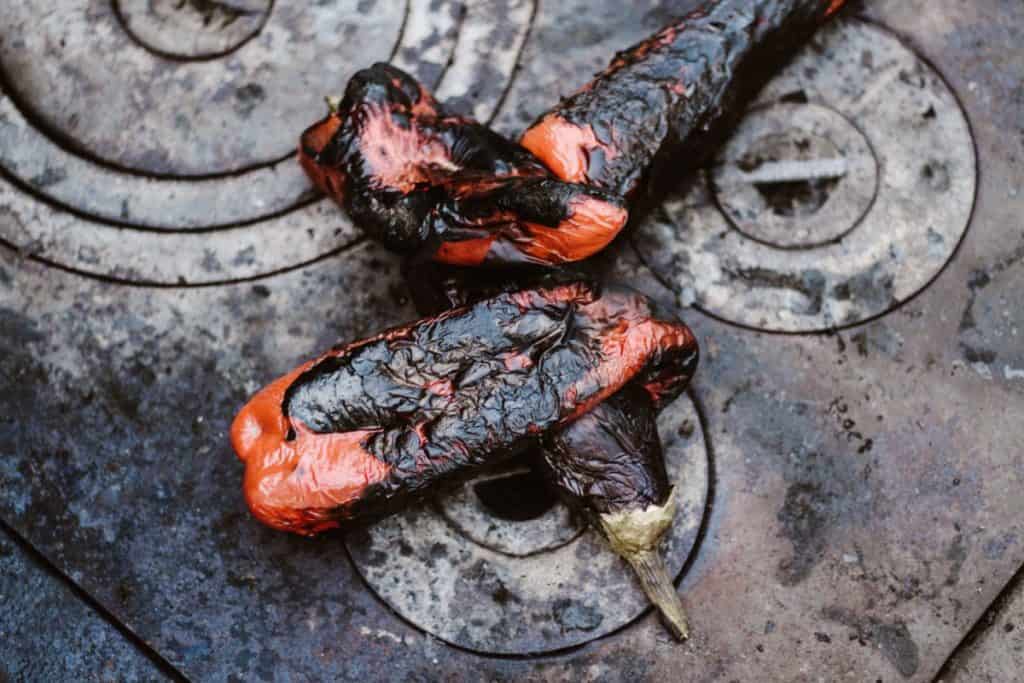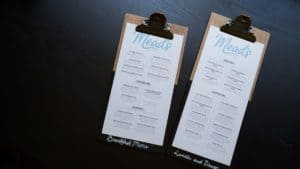When Jamie Oliver produced his T.V series ’30 minute meals’ it was a huge success and attracted millions of viewers. Many wondering, how do chefs cook so quickly?
produced his T.V series ’30 minute meals’ it was a huge success and attracted millions of viewers. Many wondering, how do chefs cook so quickly?
It also attracted a lot of online jokes and memes relating to the fact that most people felt it would take them several hours to replicate what the famous chef can do in 30 minutes.

Whilst this is probably an exaggeration it did get me thinking about why, as chefs, we are able to cook so quickly compared with ordinary home cooks.
As a chef I learnt to cook quickly due to 6 important skills. These are knife skills, timing, teamwork, not fussing with food, prior preparation, and menu planning. Each of these skills are broken down for you to follow and gain some much needed kitchen speed.
I realized that there are a few basic lessons that anyone can learn that have a huge impact on your ability to produce restaurant quality food in much less time, and with much less stress.
This is the basic idea behind how chefs can cook so quickly. In this article I will break each factor down into detail so readers can implement them in their daily cooking routine!
If you plan to have a career in catering , or simply want to be a better cook at home, then these tips will give you a great starting point for gaining some all-important cooking speed.
, or simply want to be a better cook at home, then these tips will give you a great starting point for gaining some all-important cooking speed.
1. Knife Skills Improve Chefs Cooking Speed
It may be obvious, but this is one of the fundamentals that all professional chefs have.
Knife skills allow you to prepare food incredibly quickly, drastically reducing preparation time. By getting quick at using knives, and in a safe manor, we can be preparing food whilst keeping an eye on another part of the dish that is cooking.
This automation of the knife movement frees up a large part of our brain to focus on other areas.
Knife Selection Is An Important Part Of Cooking Quickly
Part of knife skills is knowing which knife to select. We have a range of different knives in our bags which allow us to choose the knife best suited to the task.
which allow us to choose the knife best suited to the task.
A chef would never use a chopping knife to fillet a fish for example; although it can be done – it is a lot slower and less accurate.
Most home cooks don’t have this advantage of being able to choose the best knife and generally have a one knife for all tasks situation to contend with.
Using a sharp knife also plays a huge role!
also plays a huge role!
2. Chefs Are Experts At Cooking Timings
Experience gained in the kitchen allows chefs to predict surprisingly accurately when a dish is fully cooked, without resorting to timers.
In large kitchens there is simply too much going on to have every chef constantly using timers. Instead you get a feel for things.
If I put something in the oven for 20 minutes for example I can judge pretty well when that time is up. This prevents lots of back and forth trips to the oven, and also prevents burning the food.
This isn’t fool proof though I’ll point out – and there are times when the heartbreak of realizing you’ve burnt the potatoes in the oven sets in!

3. Chefs Aren’t Constantly Playing With The Food
A common trait you see with home cooks is that they feel the need to constantly stir, flip or check the food that they are cooking.
This causes a twofold problem.
- The food cooks slower because the oven door is constantly being open or the lid is being taken of the pan, reducing the heat.
- The second is the time that it takes which could be being used preparing another part of the dish.
This is an area that all new chefs in the kitchen struggle with and something that is drummed out of chefs very early on.
If you were cooking fish for example, get the pan hot, put the fish in, turn the pan heat down and then leave it alone until you have to flip the fillet once for the last 10% of cooking on the other side. That is it a four step process freeing you up to get other parts of the dish ready.
4. Preparation (mise en place) Is Essential For Chefs To Cook Quickly
One of the secret weapons that all levels of chefs use to cook so quickly, is preparation before service.
of chefs use to cook so quickly, is preparation before service.
This can range from pre-preparing vegetables etc., to cooking a dish 80% of the way so it just needs the final 20% during services. This does not mean fully cooking then reheating but rather a process called blanching (part cooking)
l’ll use a an example of the humble carrot below to help me explain;
- There are boiled carrots
 on the menu tonight. Carrots take around 20 minutes to cook which would be an inconvenience during a busy service. As a chef during the prep part of the day I would peel and cut the carrots. Next I would boil them in water until they are about 80% cooked. Then take them out and plunge them into ice water to stop the cooking process before draining them. What I am left with is blanched (or part cooked carrots).
on the menu tonight. Carrots take around 20 minutes to cook which would be an inconvenience during a busy service. As a chef during the prep part of the day I would peel and cut the carrots. Next I would boil them in water until they are about 80% cooked. Then take them out and plunge them into ice water to stop the cooking process before draining them. What I am left with is blanched (or part cooked carrots).
- During service I can then cook the carrots I need per order by putting a portion of my blanched carrots back into boiling water for the last 5 minutes they need to finish cooking before finishing in a pan with butter, salt pepper etc. This way I have perfectly cooked tasty carrots in 5 minutes service time as opposed to 25 if I cooked from scratch.
It’s interesting to note here that one of the main reasons a service can get very busy and chefs start to struggle is that when they run out of prepared food they have to start cooking completely from scratch. Always a difficult thing to juggle!
5. Chefs Use Menu Planning To Make Cooking Quicker

Menu planning is the key to chefs cooking quickly
Menu planning is something that all home cooks can use to make their cooking life easier; and ultimately quicker. Chefs are careful when planning menus to allow for different elements of each dish to be cooked in different ways.
If every element relied on the stove top then this will slow things down instead other options like the oven are used.
As an example below I will illustrate how this method could be used when cooking the accompanying sides for a roast dinner at home.
- Braised red cabbage: can be cooked the day before and reheated in the microwave when needed
- Cauliflower cheese. Prepared the day before then cooked in the oven when required.
- Broccoli: Cooked in water on the stove top.
By utilizing different cooking techniques we can reduce a lot of the service time burden and improve the speed.
Some may be surprised to see a microwave mentioned. As a means to heating already cooked food it is an excellent tool.
For example, a dish such as braised red cabbage actually improves overtime as the flavors infuse together. Making the day before then reheating for lunch the next day will produce better results than making on the day itself.
actually improves overtime as the flavors infuse together. Making the day before then reheating for lunch the next day will produce better results than making on the day itself.
6. Team Work Is An Essential Part Of How Chefs Cook So Quickly
The final important reason why chefs are able to cook so quickly is teamwork!
Each chef in the kitchen is responsible for a different element of each dish. The whole operation conducted by the Head Chef at the front of the kitchen.
at the front of the kitchen.
This is a very efficient and quick way to cook and one of the most important reasons as to why chefs can produce great food in no time at all.
To Sum Up
I hope these tips have been useful and you are able to implement them in your cooking routine so that you are producing great meals with ease.
You may also enjoy our article 7 reasons why cooking isn’t difficult!
If you are beginning a career as a chef these are the important basics you’ll learn in the first few weeks. For everyone else I would suggest trying some of these points at home and discover how effortless cooking can be!
as a chef these are the important basics you’ll learn in the first few weeks. For everyone else I would suggest trying some of these points at home and discover how effortless cooking can be!
With 10 years of experience as a professional chef, my mission is to help those just starting their chef career!
